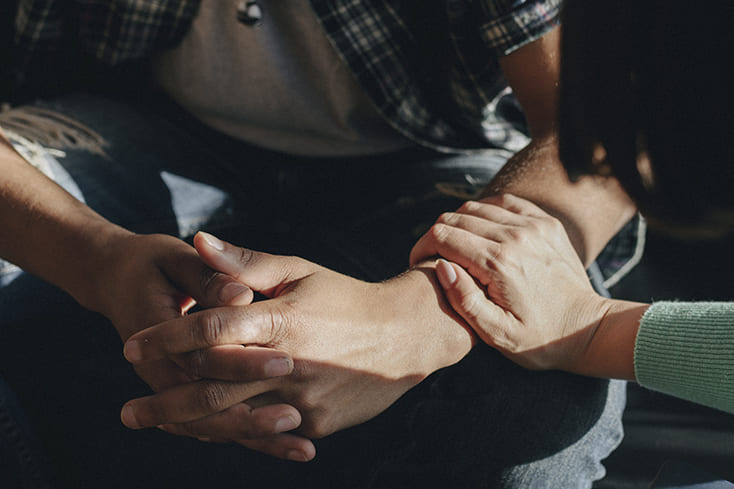September 16, 2020
By Serena Sackett
If you or someone you know is experiencing a mental health, suicide or substance use crisis or emotional distress, reach out 24/7 to the 988 Suicide and Crisis Lifeline (formerly known as the National Suicide Prevention Lifeline) by dialing or texting 988 or using chat services at 988lifeline.org to connect to a trained crisis counselor. You can also get crisis text support via the Crisis Text Line by texting NAMI to 741741.

I had been thinking about it for days — dying.
Then, while taking a clinical first responder training for work, they coached me to identify a loved one of someone who is suicidal, then focus on the impact dying would have on them. This is a tricky line to straddle. For me, if it sounds remotely like shaming or implies selfishness, it is not going to be effective.
Someone who is suicidal or depressed is already in the lowest depths of feelings like shame and self-loathing. While I cannot speak for everyone, the thoughts of how I would affect others with my death had already crossed my mind, but my brain convinced me no one would truly miss me.
There was no self-awareness that I was out of control, and I just barely understood how far down I was spiraling — that was perhaps the scariest part. I started being passive aggressive and manipulative toward my boyfriend because I needed someone to swoop in and did not have the wherewithal to say it. Many of us silently reach out for a lifeline, for a pull up. We hope that someone knows us and loves us enough to read between the lines.
My lifeline was my boyfriend. Between tears, I told him that I picked a spot, and that was it. He swooped in. Some of his words will be imprinted in my memory forever. When he texted, “I’m going to drive there. I’m coming now. I need you to keep texting me,” relief and fear rushed over me and sent me hyperventilating, vomiting into my hands and running to my toilet. He kept texting me, and I spent the next forty-five minutes trying to control my breathing.
When he got there, whenever he talked about the severity or reality of the situation, it felt like the blood got sucked from my arms and face. I felt so cold. He drove me to his house, and we watched tv and fell asleep together. The next morning, the sharpness of his voice cut through the air in my lungs. They were direct, yet not without compassion. “Right now, you need to call your psychiatrist. You need to say it’s urgent, and that you need to talk to someone today.”
My ensuing experience with the local ER and a women’s behavioral unit of the hospital were some of my longest days. The tight, white walls were painted with a mix of health care workers. Some were unbelievably compassionate. Some were miseducated and tired. One psychiatrist made me feel incredibly heard, while another straddled the wrong side of that line I mentioned before. His first words to me were, “Suicide is just not an option. I’m not saying that to shame you, but because of the consequences on everyone you’d leave behind. It’s not an option.”
See, there is a way to use the loved one angle with someone who is contemplating suicide. And I do not believe that this is it. I think it involves building a relationship, listening and validating, and finding a way to compassionately provide reminders and examples that a person is loved and valued and needed.
There was a moment in my hospital room that it clicked for me. My loved ones wanted me. They would take a phone call from me a thousand times over having to attend my funeral.
It wasn’t until after I got help that I realized, fully, that my brain had convinced itself that none of these people really needed me or loved me. Actually, it wasn’t until the afternoon that I came home from the hospital, when I walked onto a sturdy deck that my feet would have previously tripped on. My boss had come that morning and nailed the loose boards firmly down. I opened my door to a clean apartment that my boyfriend had cleared the depression out of. I saw two bouquets of flowers that a friend had placed in my living room and kitchen. When I charged my phone, I opened it to a collection of social media tags and uplifting memes from another friend.
My story could have gone a lot differently if I had not realized that I was loved. For those experiencing suicidality, give people the opportunity to step in. Reach out. And for those trying to help someone who is suicidal, don’t try to guilt them into staying alive — remind them they are loved and valued. Tell them that their loved ones want the chance to keep them.
Serena Sackett received a BS in psychology at the State University of New York, College at Oneonta. She works as a logistics manager at a wilderness therapy program and as a research assistant at a clinical service organization. She likes to spend her time in nature, hiking and exploring, with her dog and her partner.
We’re always accepting submissions to the NAMI Blog! We feature the latest research, stories of recovery, ways to end stigma and strategies for living well with mental illness. Most importantly: We feature your voices.
LEARN MORENAMI HelpLine is available M-F, 10 a.m. – 10 p.m. ET. Call 800-950-6264,
text “helpline” to 62640, or chat online. In a crisis, call or text 988 (24/7).